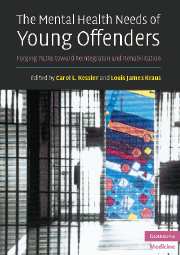Book contents
- Frontmatter
- Contents
- List of contributors
- Foreword
- Acknowledgments
- 1 An overview of child and adolescent mental health needs in the juvenile justice system
- 2 Psychiatric disorders of youth in detention
- 3 Disproportionate minority confinement
- 4 Police interrogation of youth
- 5 Assessing children's competence to stand trial and to waive Miranda rights: new directions for legal and medical decision-making in juvenile courts
- 6 The etiology of antisocial behavior: biopsychosocial risk factors across development
- 7 Substance abuse in youth offenders
- 8 Suicide and delinquent adolescents
- 9 Juvenile sex offenders
- 10 Educational needs of youth in the juvenile justice system
- 11 Science and the juvenile death penalty
- 12 Medical issues regarding incarcerated adolescents
- 13 Mental health screening and assessment in juvenile justice
- 14 Psychological testing in juvenile justice settings
- 15 Psychopharmacology and juvenile delinquency
- 16 Evidence-based treatment for justice-involved youth
- 17 Community alternatives to incarceration
- 18 Innovative problem-solving court models for justice-involved youth
- 19 Ethical issues of youthful offenders: confidentiality; right to receive and to refuse treatment; seclusion and restraint
- 20 Post-adjudicatory assessment of youth
- Index
- References
19 - Ethical issues of youthful offenders: confidentiality; right to receive and to refuse treatment; seclusion and restraint
Published online by Cambridge University Press: 11 August 2009
- Frontmatter
- Contents
- List of contributors
- Foreword
- Acknowledgments
- 1 An overview of child and adolescent mental health needs in the juvenile justice system
- 2 Psychiatric disorders of youth in detention
- 3 Disproportionate minority confinement
- 4 Police interrogation of youth
- 5 Assessing children's competence to stand trial and to waive Miranda rights: new directions for legal and medical decision-making in juvenile courts
- 6 The etiology of antisocial behavior: biopsychosocial risk factors across development
- 7 Substance abuse in youth offenders
- 8 Suicide and delinquent adolescents
- 9 Juvenile sex offenders
- 10 Educational needs of youth in the juvenile justice system
- 11 Science and the juvenile death penalty
- 12 Medical issues regarding incarcerated adolescents
- 13 Mental health screening and assessment in juvenile justice
- 14 Psychological testing in juvenile justice settings
- 15 Psychopharmacology and juvenile delinquency
- 16 Evidence-based treatment for justice-involved youth
- 17 Community alternatives to incarceration
- 18 Innovative problem-solving court models for justice-involved youth
- 19 Ethical issues of youthful offenders: confidentiality; right to receive and to refuse treatment; seclusion and restraint
- 20 Post-adjudicatory assessment of youth
- Index
- References
Summary
Introduction
A youth is held at a juvenile detention facility while awaiting legal disposition of his pending charges. The youth was recently prescribed multiple psychotropic medications in the community for “out of control” behaviors. The youth disclosed to detention staff that he was medication non-compliant and actively abusing illicit substances. The youth's urine drug screen was positive for cannabinoids and cocaine metabolites. There are no past mental health or medical records available. A clinical decision was made to hold all of the past psychotropic medications and establish a diagnostic baseline. A few days later, the youth was involved in an altercation with a peer and required physical restraint by staff and was placed in disciplinary “lock-up” status. The youth's family is upset that the psychotropic medications were discontinued. They blame the altercation, behavioral dyscontrol, and resulting disciplinary status on the lack of current psychotropic medication treatment. It remains unclear if the family is aware of the youth's recent substance abuse and medication non-compliance. The family is insistent that the youth's psychotropic medications be restarted. During a psychiatric evaluation, the youth does not appear motivated for mental health or substance abuse treatment, but is willing to comply with anything that will result in a more favorable legal disposition and shorter period of confinement.
Who has the right to make treatment decisions for this youth?
Keywords
- Type
- Chapter
- Information
- The Mental Health Needs of Young OffendersForging Paths toward Reintegration and Rehabilitation, pp. 401 - 422Publisher: Cambridge University PressPrint publication year: 2007
References
- 1
- Cited by

